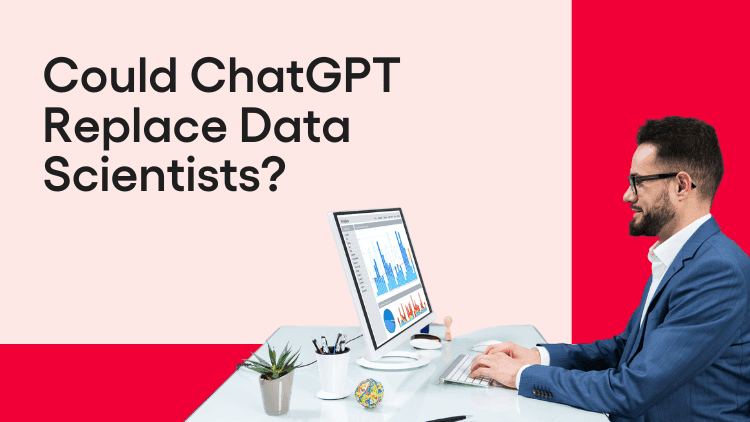Imagine a world where all data-related tasks, from analyzing complex datasets to building predictive models, are effortlessly carried out by an AI-powered chatbot. A world where the arduous tasks performed by Data Scientists are simplified and accelerated through natural language interactions.
Welcome to the age of ChatGPT - an innovative AI language model that has sparked a debate about the future of Data Science and the potential replacement of Data Scientists. In this blog, we will explore this controversial topic, debunk its myths, and understand how ChatGPT and Data Scientists can coexist harmoniously. We will also understand - will Data Science be automated and will Chat GPT replace jobs.
Understanding the Power of ChatGPT
ChatGPT, based on the revolutionary GPT-3.5 architecture, is undeniably a transformative technology. It has the ability to understand context, generate human-like responses, and perform a wide range of tasks, including language translation, content creation, and even code writing. The potential applications of ChatGPT in the Data Science realm are immense, but does this mean it could fully replace Data Scientists? Let's delve deeper.
The Myth of Replacement
The Fear of Job Loss
One of the major concerns surrounding the rise of ChatGPT is the fear of job loss among Data Scientists. As organizations seek to optimize costs and streamline processes, the idea of a cost-effective AI solution handling data-related tasks might be tempting. However, it is essential to remember that Data Science is not just about crunching numbers; it involves understanding business problems, developing creative solutions, and providing actionable insights. These are areas where ChatGPT might not fully replace the human touch.
The Limitations of ChatGPT
Limitations of ChatGPT: While ChatGPT is highly impressive, it does have limitations. The model relies on pre-existing data and lacks real-time learning capabilities. On the other hand, Data Scientists are adept at designing experiments, creating new algorithms, and adapting to novel scenarios. They can fill in the gaps where ChatGPT falls short, especially when dealing with ambiguous or unstructured data.
The Synergy of ChatGPT and Data Scientists
Enhancing Data Analysis Efficiency
Rather than replacing Data Scientists, ChatGPT can act as a valuable assistant, speeding up the data analysis process. ChatGPT allows data scientists to focus on more strategic and creative aspects of their work by automating repetitive tasks like data cleaning and preliminary analysis. This collaboration can result in more efficient data-driven decision-making.
Democratizing Data Insights
Not every organization has the resources to hire a team of Data Scientists. ChatGPT, with its user-friendly interface, can democratize data insights, making advanced analytics accessible to a broader audience. This could enable smaller businesses and startups to leverage data-driven strategies without substantial upfront investments.
Improving Data Science Education
Aspiring Data Scientists often struggle to gain practical experience due to the limited availability of real-world datasets. ChatGPT can generate synthetic datasets and be a powerful learning tool for Data Science students, helping them refine their skills before entering the job market.
Ethical Concerns and Human Oversight
Bias and Fairness
ChatGPT, like any AI model, is susceptible to biases present in its training data. Data Scientists are crucial in identifying and mitigating these biases to ensure fair and ethical AI deployments. Their expertise is vital in preventing unintentional harm caused by biased AI recommendations.
Accountability and Decision-Making
Data Scientists are responsible for the decisions made based on AI insights. They can interpret model outputs, validate results, and make informed decisions with a deeper understanding of the implications. This human oversight ensures that AI-driven decisions align with business objectives and ethical standards.
Embracing the Future: Collaboration, Not Replacement
While ChatGPT is undoubtedly a game-changer in AI, it is not the harbinger of doom for Data Scientists. Instead of fearing replacement, Data Scientists should embrace collaboration with AI and focus on upskilling to work alongside these powerful models.
Check out our latest blogs on "Future of ChatGPT" and "Ethical Considerations of Using ChatGPT"
Conclusion
To answer the question of - will Data Scientists be automated - the rise of ChatGPT is not the end but the beginning of a transformative era for Data Science. While AI-powered models like ChatGPT can augment data analysis and streamline processes, they lack the creativity, adaptability, and ethical judgment that Data Scientists possess. Rather than fearing replacement, Data Scientists should harness the potential of ChatGPT as an ally and work in harmony to achieve new heights in data-driven innovation. The future belongs to those who embrace change, combine human ingenuity with AI's power, and continue to push the boundaries of what's possible in the fascinating world of Data Science. while ChatGPT is a powerful tool for data-related tasks, it cannot replace the essential expertise and critical thinking skills of data scientists. To learn more about ChatGPT's capabilities and limitations, explore our latest ChatGPT tutorial.


